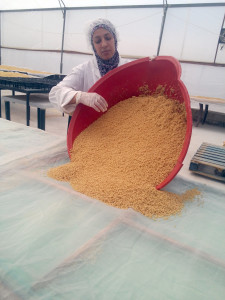mPALESTINE
Palestinian Fair Trade Couscous – Success for Al-Maftool Cooperative
Couscous is one of the most popular dishes in Palestine, suitable for poor and rich alike due to its affordability, and considered as part of local culture.
However, its popularity began to wane in recent years and in response to this, numerous cooperatives were created to produce the grain in country, specifically in the Gaza Strip. In 2007, the siege of Gaza began which prevented the cooperatives from both importing the required machinery and exporting the end product, couscous. As a result, the cooperatives stopped production and shut their doors.
From this sad situation came an inspirational idea by a group of women to re-form the couscous cooperative, but this time in Jericho.
Al-Maftool, the coarser large grain variety of the dish, is particularly popular and the cooperative adopted it as their name.
The Palestinian Agricultural Relief Committees (PARC), in cooperation with Al Reef for Investment and Agricultural Marketing, deemed this project to be so important that they provided the women with advice and support from food engineers and processers, as well as providing them with the necessary equipment and machines.
Year after year, the Al-Maftool women of Jericho have achieved success by producing 80 tonnes consistently, in addition to exporting large quantities of couscous to the USA and Europe, in particular Italy and Belgium.
In addition, the cooperative is supporting wheat farmers in Jenin by using their wheat, the main ingredient of couscous – making their ‘maftool’ 100% Palestinian.
The cooperative achieved international recognition for their product by winning first prize for ‘Best couscous dish’ in the annual competition at San Vito Lo Capo, Italy.
The cooperative has become a source of real pride for these brave women by providing them with enough income to live well and improve their existence.
Shadia Farwala is a shining example. Shadia has been part of the cooperative since 2007:
“Being a member of Al-Maftool cooperative has helped me not only financially but personally – it has really helped me develop my own personality. Through working I feel that I’m a much more useful member of society. The work gives me the chance to help my husband, and allows me to send my kids to better schools. I can also give them my full attention when they return from school as I finish work early in the afternoon”.
Shadia mentioned that the climate in Jericho is one of the reasons the cooperative has been such a success as couscous production needs hot weather. The cooperative has provided work opportunities for many women, giving them the chance to stay close to their home and children, whilst raising their overall living standards without the need to work on illegal Israeli settlements.
While interviewing Shadia, I was delighted to hear her give me the correct definition of Fair Trade.
She defined it as; “The best way to give fair prices to Palestinian producers, allowing them to live in dignity and raise their standard of living because Palestinian products are high quality products and deserve fair prices”.
As mentioned earlier, the wheat used is produced by farmers from Jenin, who’ve also had help, having undergone capacity building training on wheat production. The women’s cooperative only uses Palestinian wheat to produce their couscous, making their couscous truly 100% Palestinian.
For more information visit:
Fair Trade Department / Agricultural Development Association, Al Reef Company













